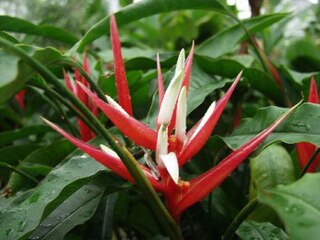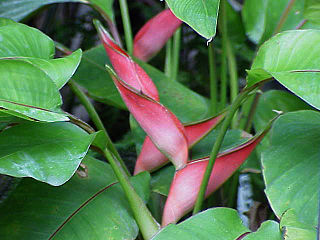
Heliconia, derived from the Greek word Ἑλικώνιος, is a genus of flowering plants in the monotypic family Heliconiaceae. Most of the ca 194 known species are native to the tropical Americas, but a few are indigenous to certain islands of the western Pacific and Maluku. Many species of Heliconia are found in the tropical forests of these regions. Most species are listed as either vulnerable or data deficient by the IUCN Red List of threatened species. Several species are widely cultivated as ornamentals, and a few are naturalized in Florida, Gambia, and Thailand. Common names for the genus include lobster-claws, toucan beak, wild plantain, or false bird-of-paradise. The last term refers to their close similarity to the bird-of-paradise flowers (Strelitzia). Collectively, these plants are also simply referred to as "heliconias".

Heliconia angusta Vell., of family Heliconiaceae is an erect herb typically growing 0.70 m tall, native to Brazil.

Heliconia stricta is a plant species native to Brazil, Colombia, Venezuela, Ecuador, Peru, Bolivia, Guyana, Suriname, reproducing by seeds and by underground rhizomes. It is reportedly naturalized in Cuba and Puerto Rico, and cultivated as an ornamental in many other warm regions.
Heliconia berryi is a species of plant in the family Heliconiaceae. It is endemic to Ecuador. Its natural habitat is subtropical or tropical moist montane forest.
Heliconia brenneri is a species of plant in the family Heliconiaceae. It is endemic to Ecuador. Its natural habitat is subtropical or tropical moist montane forest. The expansion of the road passing through its range poses a potential threat.
The name is derived from the Greek word Ἑλικώνιος (helikṓnios) meaning Lobster Claws, another word for Heliconias. The second part is from the Latin word Excelsa, sometimes meaning tall, probably meaning "tall Lobster Claw" all together. Heliconia excelsa is a species of plant in the family Heliconiaceae. It is endemic to Ecuador. Its natural habitat is subtropical or tropical moist lowland forest. At its maturity, it can reach a height of 8' to 12' or 15' in full sun to half shade.
Heliconia × flabellata is a species of plant in the family Heliconiaceae. It is endemic to Ecuador. Its natural habitat is subtropical or tropical moist lowland forest. It is apparently a hybrid, H. episcopalis × H. rostrata.
Heliconia fredberryana is a species of plant in the family Heliconiaceae. It is endemic to Ecuador. Its natural habitat is subtropical or tropical moist montane forest.
Heliconia gaiboriana is a species of plant in the family Heliconiaceae. It is endemic to Ecuador. Its natural habitat is subtropical or tropical moist montane forest.
Heliconia litana is a species of plant in the family Heliconiaceae. It is endemic to Ecuador. Its natural habitat is subtropical or tropical moist montane forest.
Heliconia lutheri is a species of plant in the family Heliconiaceae. It is endemic to Ecuador. Its natural habitat is subtropical or tropical moist montane forest.
Heliconia markiana is a species of plant in the family Heliconiaceae. It is endemic to Ecuador. Its natural habitat is subtropical or tropical moist montane forest.

Heliconia obscura is a species of plant in the family Heliconiaceae. It is native to Ecuador and Peru. Its natural habitats are subtropical or tropical moist lowland forests and subtropical or tropical moist montane forests.
Heliconia paludigena is a species of plant in the family Heliconiaceae. It is endemic to Ecuador.
Heliconia pardoi is a species of plant in the family Heliconiaceae, endemic to Ecuador. Its natural habitat is subtropical or tropical moist montane forest.
Heliconia peckenpaughii is a species of plant in the family Heliconiaceae. It is endemic to Ecuador. Its natural habitat is subtropical or tropical moist montane forest.
Heliconia peteriana is a species of plant in the family Heliconiaceae. It is endemic to Ecuador. Its natural habitats are the subtropical or tropical moist montane forest.
Heliconia riopalenquensis is a species of plant in the family Heliconiaceae. It is endemic to Ecuador. Its natural habitats are subtropical or tropical moist lowland forest and subtropical or tropical moist montane forest.
Heliconia sclerotricha is a species of plant in the family Heliconiaceae. It is endemic to Ecuador.
Heliconia willisiana is a species of plant in the family Heliconiaceae It is endemic to Ecuador.

